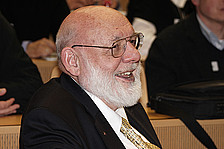 The eminent biologist Walter Gehring died on May 29, 2014, at the age of 75, according to the Biozentrum at the University of Basel. His scientific work concentrated on the fruit fly Drosophila and the genetic control of its development. He and his colleagues are credited with discovering homeobox genes — which regulate the expression of DNA in development — and identifying the master control genes for the development and evolution of the eyes. Two future Nobel laureates, Christianne Nüsslein-Volhard and Eric Wieschaus, worked in his laboratory. His 1993 Terry Lectures at Yale University were published as Master Control Genes in Development and Evolution: The Homeobox Story (Yale University Press, 1998).
The eminent biologist Walter Gehring died on May 29, 2014, at the age of 75, according to the Biozentrum at the University of Basel. His scientific work concentrated on the fruit fly Drosophila and the genetic control of its development. He and his colleagues are credited with discovering homeobox genes — which regulate the expression of DNA in development — and identifying the master control genes for the development and evolution of the eyes. Two future Nobel laureates, Christianne Nüsslein-Volhard and Eric Wieschaus, worked in his laboratory. His 1993 Terry Lectures at Yale University were published as Master Control Genes in Development and Evolution: The Homeobox Story (Yale University Press, 1998).
Interviewed by the University of Barcelona, from which he received an honorary degree in 2010, Gehring was asked, "Relative to the resurgence of old theories such as intelligent design and creationism. Does the scientist have the responsibility to try to avoid this resurgence?" He replied, "Yes, I think we are always trapped. We are thinking in human terms, we are humans, so we think in human terms. We think that nature was constructed by a human engineer or a human being or a perfect God similar to a human being," and proceeded to describe in detail a case where he assumed, wrongly, that a biological pattern was generated in a way that a human engineer would have produced it. In the same interview, he approvingly cited Theodosius Dobzhansky's dictum that nothing makes sense in biology except in the light of evolution. Asked about the compatibility of evolution and religious belief, he expressed agnosticism: "I personally don't [believe] in a personal God that is like a human being. I told you evolution shows that it's not a human engineer sitting in the sky on a cloud who designs life, but life has generated by itself and this doesn't mean that there is a divine superior kind of being behind nature. We couldn't possibly grasp that. I'm trying to find out how nature works, and if there is something else behind nature it is difficult to say."
Gehring was born in Zurich, Switzerland, on March 30, 1939. He received his Ph.D. in zoology from the University of Zurich in 1965, and then went to Yale University, first as a post-doctoral researcher and then as a faculty member. In 1972, he returned to Switzerland, where he was Professor of Genetics and Developmental Biology at the Biozentrum at the University of Basel until his retirement. He was a foreign member of the National Academy of Sciences and the Royal Society of London. Among his honors were the Jeantet Prize for Medicine (1987), the March of Dimes Prize in Developmental Biology (1997), the Kyoto Prize for Basic Science (2000), and the Balzan Prize for Developmental Biology (2002).
